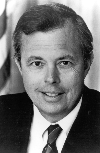|
 The
inability of California lawyers who have passed our rigorous bar
examination to use their California license out of state has long been
a sore point. The
inability of California lawyers who have passed our rigorous bar
examination to use their California license out of state has long been
a sore point.
The primary reason for this state of affairs has
been California's unwillingness to grant reciprocity to lawyers from
other states; the primary reason for this is protection of our
consumer clients from lawyers from other states without an
understanding of California law, some of whom may fall beneath the
lofty standards we set for our lawyers.
Call it Consumer Protection. Call it
Protectionism. Call it Elitism.
The result has been tough on California lawyers
who may want to practice elsewhere and have to meet the standards
(i.e. exam) imposed by other states.
The Supreme Court's 18-person Advisory Task
Force on Multijurisdictional Practice put its toe in the water in its
Jan. 7, 2002, report on the subject, recommending some limited but
worthwhile changes in our rules.
No, it does not open the floodgates that would
permit us to take our State Bar card to other states as an "Open
Sesame" to practice law.
Instead it would open the door a bit wider for
out-of-state lawyers. Today we permit out-of-state attorneys to appear
"pro hac vice," and grant limited authority to foreign legal
consultants, out-of-state arbitration counsel and military counsel.
The report recommends permitting in-house counsel
to provide services to a single business entity employer, to register
and be permitted to practice here provided they pay registration fees,
abide by our State Bar rules, and submit to its discipline, on the
condition they're members in good standing of the bar of another
state. Such registrants would not be permitted to make court
appearances.
From a consumer protection point of view, that
makes sense. Their employer is their client. The employer will suffer
the consequences if its lawyer performs inadequately.
The task force also concluded that out-of-state
lawyers relocating to California should for a limited duration be
permitted to practice public interest law under the supervision of
public interest lawyers before becoming members of the State Bar. The
purpose: increase access to justice for the indigent. A worthy cause.
At the same time, from a consumer protection standpoint, if we're to
go forward with this exception, very tight rules will have to be
adopted defining when it's applicable. The assurance of supervision,
and a very limited duration of the time of such practice before
standard membership rules, should apply.
We've had enough trouble with non-lawyers
practicing law, as our State Bar President Karen Nobumoto has pointed
out: if we adopt this exception we need to make sure the indigent
we're trying to serve don't get shoddy representation.
The third exception is defined as a "safe
harbor exception" for lawyers licensed elsewhere who come to
California temporarily to provide legal services - in transactional
matters, i.e. non-litigation. It's similar to the pro hac vice
"safe harbor" our courts provide to litigators from out of state.
Given the extensive cross-boundary work that goes on today, an
exception of this sort does represent what the committee described as
the "modern realities of legitimate legal practice." The devil
here will be in the details, i.e., the drafting of regulations
relating to duration, frequency and the scope of permissible activity.
A final recommendation is one that permits an
out-of-state attorney to perform non-litigation tasks in California
for cases they intend to file here or that they have filed and are
pending elsewhere. Once filed here, pro hac vice rules apply.
In all these situations, it would be desirable to
assume that, even when registration is not required, those who use the
"safe harbors" subject themselves to State Bar discipline.
The committee's proposed changes, if
implemented, work gradual and worthwhile change, and to the extent
they can, should be coupled with encouragement that other states grant
similar registration and "safe harbor" requirements for California
lawyers working in their jurisdictions.
 John K. Van de Kamp represents Los Angeles on the State Bar Board
of Governors. He is the former attorney general of California.
John K. Van de Kamp represents Los Angeles on the State Bar Board
of Governors. He is the former attorney general of California.
|

